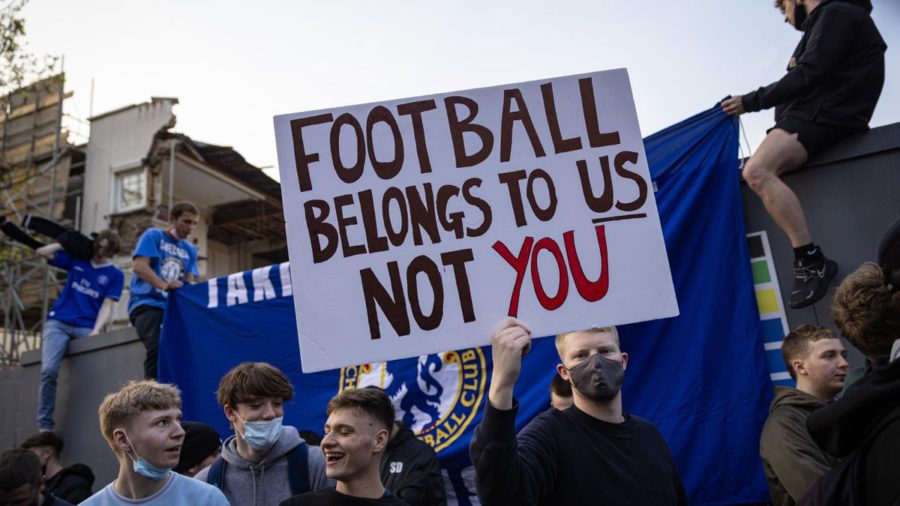Corruption is Staining the Soul of Soccer
Chelsea fans protest the team’s involve- ment in the proposed Super League.
Today, it is impossible to watch a soccer game without taking note of the bright colored sponsorships on players’ chests and sleeves or advertisement boards displaying an endless array of brand deals. It is difficult to shop without stumbling upon shirts, clocks, posters, or water bottles stamped with a club’s logo across the middle. £190 million signings and six-figure weekly wage bills are the effects of football clubs becoming brands and businesses. How did we get here?
In 2003, Russian oligarch Roman Abramovich acquired Chelsea for £140 million, and after investing more than £1.5 billion into the club, he transformed Chelsea from an average club to a European powerhouse. Now, Abramovich is set to sell Chelsea for £2.7b after being forced to divest the club due to his close personal ties with Vladimir Putin in light of Russia’s war with Ukraine. Chelsea’s financial takeover is not an anomaly; Sheik Mansour’s purchase of Manchester City, Qatar Sports’s investment in Paris Saint Germain, and most recently, the Saudi Arabian Fund’s acquisition of Newcastle United in October are all examples of how uber-wealthy owners with a blank checkbook are all it takes to compete with the world’s elite clubs. With every new buyout and more money being invested into the sport, money-hungry owners and executives are corrupting the heart of world soccer.
On April 18, 2021, a press release sent the sporting world into turmoil. 12 of the biggest clubs in the world announced they would leave their domestic leagues, creating a European Super League backed by a $1 billion JP Morgan investment, in which they would compete against each other to be crowned champions of Europe. This announcement prompted outcry from the footballing world and fans across the globe were left in distress. Due to monetary challenges, there was doubt most clubs would even survive. Thousands of fans gathered in stadiums around the world and flooded social media to protest the enactment of the Super League. In less than 48 hours after the announcement, more than half of the teams involved publicized their intention to withdraw. Only one thing drove these clubs to the Super League, unbridled greed. Executives eschew the essence and purity of the game for the opportunity to make a quick buck.
In 2008, Mansour and Abu Dhabi’s royal family bought Manchester City F.C. for £123.5m. The previous season, Manchester City had barely managed a top-ten finish in the Premier League and seemed to be forever stuck in the shadow of their cross-town rivals, Manchester United. Today, Manchester City sits amongst Europe’s elite clubs, in line to win their fourth Premier League title in five years. Multi-million dollar sponsorship deals, flashy signings, and stadium renovations make the club feel completely different from what it was before. Despite dominance on the pitch, the increased marketability and global attraction make Manchester City, and other teams around the world, feel like a brand instead of a football club. An owner’s motive is not to maximize on-pitch performance or appeal to fans, but to profit off what seems like a business venture to them. In Mansour’s 14 years at Manchester City, he has invested over £1.4 billion into the club and the club is now worth £2.98 billion (Forbes 2022), over 2,400 times more valuable than when Mansour purchased the club in 2008. Although fans get to enjoy great success, a club once united by the passion and spirit of its supporters became a global brand over the span of a few years.
What used to be a sport based on loyalty, passion, and unity is now turning into a playground for rich executives. If this rapid development keeps continuing, it won’t be long before soccer is only about who can sell the most jerseys or rack up the biggest sponsorship deals. In a world where money is many peoples’ largest priority, soccer is proving to be no different.






